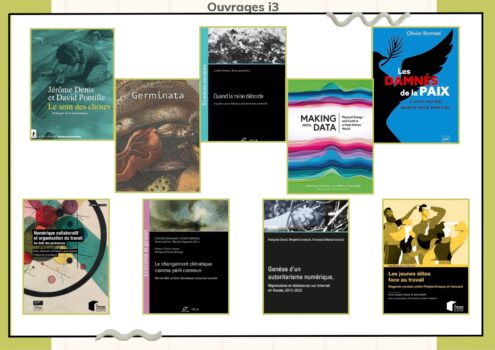
- This event has passed.
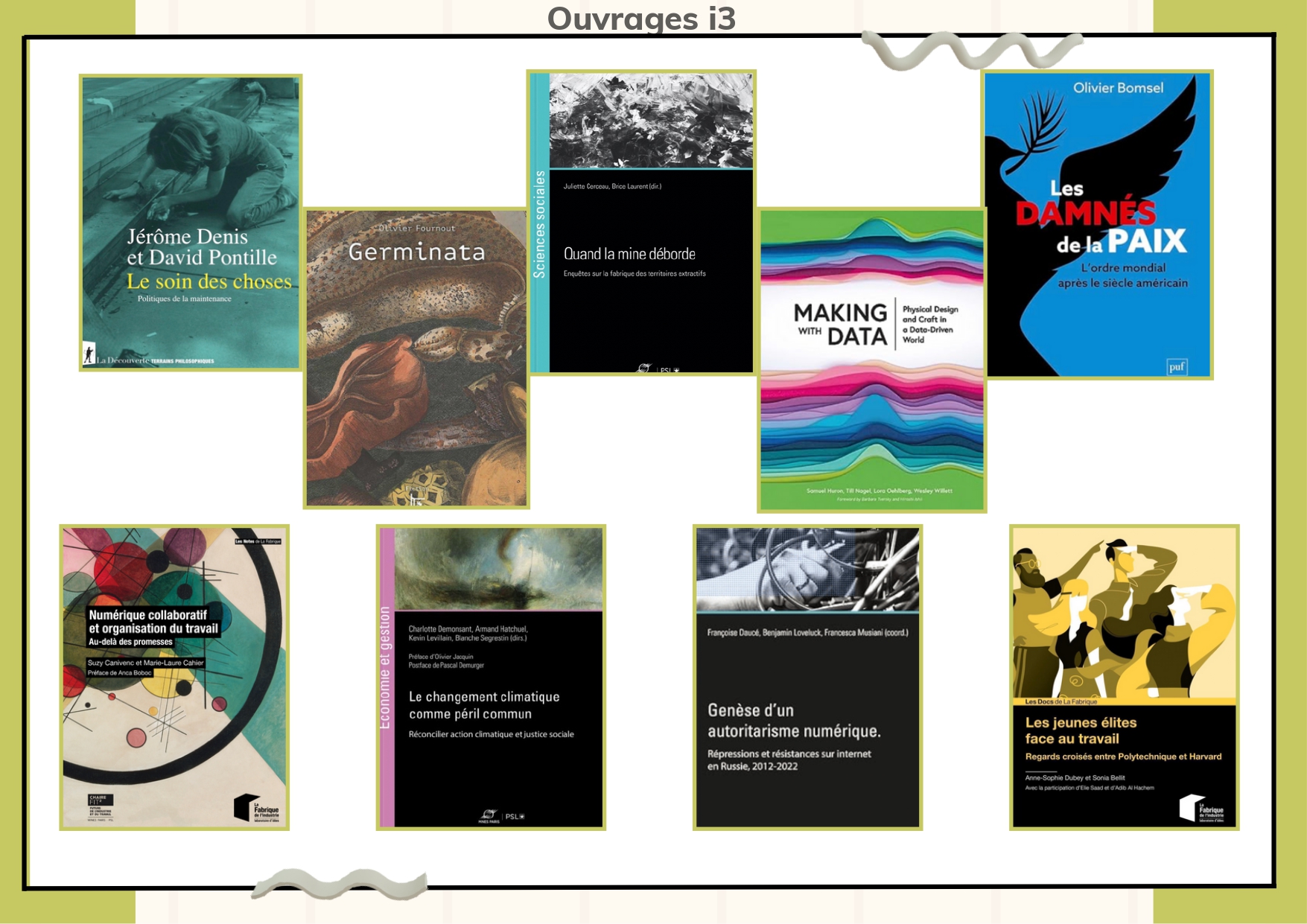
CERNA
Les damnés de la paix (The damned of peace) by Olivier Bomsel
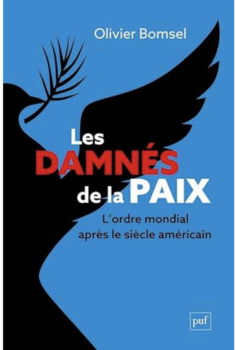 Violence is the major problem facing every society. The "theory of social orders" (2009) uses it to decode the institutions and rules that govern politics and the economy. This reading of contemporary history contrasts two ideal-types: natural states, where access to resources or privileges is conditional on allegiance to power, and open-access orders, where the market economy and representative democracy coordinate under the cover of the rule of law. Globalisation has plunged these two ideal-types into a single arena. But open-access orders are making headway and embarrassing natural states. This essay argues that "open access orders have reached critical mass", meaning that they are now numerous and influential enough to contain global violence. After fifty years of American domination, it is up to them jointly to contain pandemics, Russian imperialism and global warming - in short, to ensure world order.
Violence is the major problem facing every society. The "theory of social orders" (2009) uses it to decode the institutions and rules that govern politics and the economy. This reading of contemporary history contrasts two ideal-types: natural states, where access to resources or privileges is conditional on allegiance to power, and open-access orders, where the market economy and representative democracy coordinate under the cover of the rule of law. Globalisation has plunged these two ideal-types into a single arena. But open-access orders are making headway and embarrassing natural states. This essay argues that "open access orders have reached critical mass", meaning that they are now numerous and influential enough to contain global violence. After fifty years of American domination, it is up to them jointly to contain pandemics, Russian imperialism and global warming - in short, to ensure world order.
Olivier Bomsel is a civil engineer at the Ecole des Mines and professor of industrial economics at the Ecole des Mines de Paris. He is head of research on the digital economy at Cerna, the industrial economics laboratory at the École des Mines.
Numérique collaboratif et organisation du travail – Au-delà des promesses (Digital collaboration and work organisation - Beyond the promises) by Suzy Canivenc and Marie-Laure Cahier
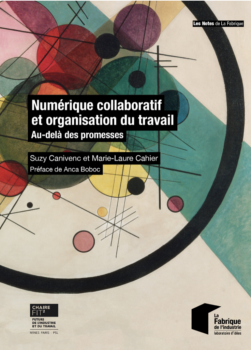
As a result of the health crisis and the development of teleworking, a new wave of digital tools was deployed in organisations: company messaging, videoconferencing, instant messaging, document storage and sharing platforms, no-code platforms, etc. These tools, generally referred to as "collaborative tools", already existed in some organisations, but the crisis undeniably accelerated their adoption. Above all, because of the unexpected and brutal nature of the pandemic episode, these new tools were introduced in the greatest disorder. At the end of this period, a number of surveys showed that employees were feeling increasingly uneasy about this chaotic digitisation, which was leading to technostress and infobesity. Against this backdrop, and based on a field study, this book looks at the effects of the recent introduction of collaborative tools in organisations, and more specifically on ways of working. The digital tools that are supposed to support new forms of work are examined here from a critical perspective: what changes do they make to perceived ways of working? Do they really support the advent of new ways of working, and hybrid working in particular? If so, under what conditions? Do they produce undesirable effects? And if so, what are they and why? This book is a continuation of the work carried out by the Futures of Work Chair.
Suzy Canivenc has a doctorate in information and communication sciences, teaches management and communication at the Université Catholique de l'Ouest and is an associate researcher at the "Futures of Industry and Work" (FIT²) chair at Mines Paris.
Marie-Laure Cahier A graduate in law and from Sciences Po Paris (International Relations), Marie-Laure Cahier spent fifteen years as editorial director in university and professional publishing. In 2010 she founded Cahier&Co, a consultancy, editorial coaching, content production and management company.
CSI
Le soin des choses. Politiques de la maintenance (Taking care of things. Maintenance policies) by Jérôme Denis and David Pontille, Prix du livre de l'architecture 2023
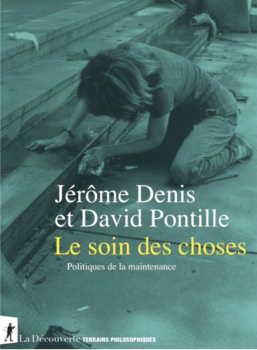
What do a boiler, a car, a signpost, a smartphone, a cathedral, a work of art, a satellite, a washing machine, a bridge, a clock, a computer server, the body of an illustrious statesman and a tractor all have in common? Almost nothing, except that none of these things, large or small, precious or commonplace, lasts without some form of maintenance. Every object wears out, deteriorates, breaks down or even disappears. But do we really appreciate the importance of maintenance? As a counterpoint to the contemporary obsession with innovation, and less spectacular than the singular act of repair, this delicate art of making things last is rarely brought to our attention.
This book is an invitation to take a fresh look at maintenance and the people who carry it out. Following the thread of different stories, the authors describe the subtleties of 'taking care of things', highlighting the ethical issues involved and the political implications. By cultivating a sensitive attention to fragility and inventing a day-to-day material diplomacy that resists the frantic pace of programmed obsolescence and over-consumption, maintenance outlines the contours of a world far removed from the pretensions of human omnipotence and technological autonomy. A world in which forms of attachment to things are far less trivial than we might imagine.
Jérôme Denis is a lecturer and researcher at Telecom ParisTech. His research focuses on the conditions of production of different graphic devices, on prescription in the workplace and on the use of new technologies.
David Pontille is a CNRS researcher and co-founder of the 'Anthropologie de l'écriture' team (CNRS/EHESS). His research explores the relationships between writing, action and cognition in different professional environments, particularly in science and law.
Quand la mine déborde :Enquêtes sur la fabrique des territoires extractifs (When the mine overflows: Investigations into the making of extractive territories) by Juliette Cerceau and Brice Laurent
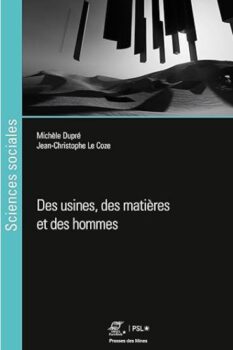
Health and geopolitical crises are having a considerable impact on supplies. Energy and digital transitions are increasing the need for minerals and are forcing us to question the extractive sector: how can we live in mining areas and deal with the consequences of extraction?
Can mining activities coexist with farming, tourism and forestry?
What kind of social life can workers in the extractive industry enjoy?
Some mining areas have to deal with the indelible traces of former mining activities. Using examples from West Africa, Latin America, North America and France, this book shows how extractive activity 'shapes' the territory, in its geophysical, environmental and hydrological components, as well as its health, social, economic and political aspects. It shows that contemporary debates on mining projects must be confronted with the construction of these territories in order to question the role of localities in national or even global extractive policies.
Juliette Cerceau defended her thesis in December 2013 entitled "Industrial ecology as a territorial construction process: application to port areas". As part of this research work, she contributed to a review of experiences of circular economy and industrial ecology dynamics in port areas in North America, Europe, Africa and Asia.
Brice Laurent is a researcher at the CSI and Director of the Social Sciences, Economy and Society Department at the French National Agency for Environmental, Food and Occupational Health Safety (ANSES). His research focuses on the relationship between science and democracy, based on surveys carried out in places where innovation is promoted, regulated or contested.
CGS
Le changement climatique comme péril commun (Climate change as a common threat) by Charlotte Demonsant, Armand Hatchuel, Kevin Levillain and Blanche Segrestin
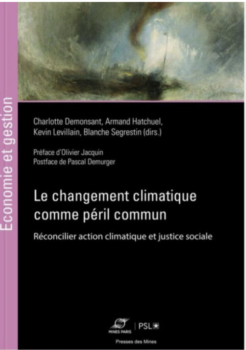
The fight against climate change is threatened with paralysis. Neither governments nor international institutions have succeeded in establishing clearly shared principles of justice, on the basis of which the necessary efforts can be distributed fairly.
Faced with this alarming situation, this book proposes new ways of reconciling climate action and social justice. It shows that climate policies come up against a dilemma between equity and efficiency because the instruments envisaged, such as economic incentives, are aimed above all at efficiency and leave the question of equity to ad hoc political and societal arrangements. This book reverses the approach: climate action can become both more effective and fairer if it is recognised as rescue action in the face of a common peril.
This notion of common peril opens the way to new, highly robust solutions. For example, the old rule of "general average" derived from maritime law makes it possible to share equitably the sacrifices made to escape a common peril. In the face of climate change, a rule of justice such as this, laid down as a prerequisite, would guarantee both the most effective measures and everyone's agreement to the efforts required.
This book invites researchers and policy-makers to take stock of the liberating implications of this approach for climate action.
With contributions from Charlotte Demonsant, Geneviève Fontaine, Maria Fusaro, Armand Hatchuel, Corinne Lepage, Kevin Levillain, Dario Mantovani, Antonin Pottier, Judith Rochfeld et Blanche Segrestin
Charlotte Demonsant is a doctoral student at the Scientific Management Centre at Mines Paris, PSL University. Her research focuses on solidarity models for climate action.
Armand Hatchuel, born in 1952, is a professor and researcher in management science and design theory. Most of his work has been carried out with other researchers from the Centre de Gestion Scientifique at Mines Paris.
Kevin Levillain is a teacher-researcher at the Centre de Gestion Scientifique (CGS) at MINES ParisTech.
With Blanche Segrestin, he coordinates the work of the Chair in Corporate Theory - Governance Models & Collective Creation.
Blanche Segrestin is Professor of Management Sciences at Mines ParisTech, PSL University and Director of the CGS. Since 2015, she has been responsible, with Kevin Levillain, for the chair in "The Theory of the Firm. Governance models and collective creation".
L'innovation mais pour quoi faire (Innovation, but for what) ? by Franck Aggeri
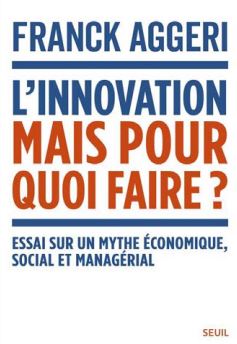 Innovate, innovate, innovate: that's the magic formula that keeps coming out of the mouths of economists and politicians. But no one asks why this constant frenzy of technological, managerial, financial, public or social innovation, and above all, for what purpose?
Innovate, innovate, innovate: that's the magic formula that keeps coming out of the mouths of economists and politicians. But no one asks why this constant frenzy of technological, managerial, financial, public or social innovation, and above all, for what purpose?
The injunction to innovate ever more and ever faster is in fact paradoxical: past innovations have often helped to exacerbate the ecological, geopolitical, social and financial crises we are experiencing today. To understand this paradox, this book tells the story of how a culture of innovation was formed, based on the belief that innovation is the condition for economic, environmental and social progress, and how this culture is associated with positive values such as creativity and entrepreneurial freedom. This book shows that this enchanted vision is in fact dangerous: it underestimates the dark sides of innovation, which are all the more difficult to spot because they appear late, just as they are being disseminated on a large scale.
How can we innovate differently to avoid these undesirable effects and contribute to a more sustainable society? The book explores two complementary avenues: making innovators aware of the long-term consequences of their projects; and the potential of more sober innovations based on transforming lifestyles, consumption and production patterns, compatible with the principles of sustainable development.
Franck Aggeri, Professor of Management at Mines Paris - PSL, specialises in the circular economy, ecological transition and responsible innovation. He is also co-director of the "mines urbaines" chair dedicated to the circular economy and a columnist for Alternatives Économiques.
L'économie circulaire (L'économie circulaire) by Franck Aggeri, Rémi Beulque and Helen Micheaux
 The circular economy is becoming increasingly popular. Its promoters present it as an alternative model to the dominant linear economy, which is based on the extraction of non-renewable resources and generates waste. The circular economy promises to decouple economic growth from environmental impact, thanks to strategies for reducing material and energy flows at source and closing the loop. This model is also supposed to create local economic wealth and local jobs.
The circular economy is becoming increasingly popular. Its promoters present it as an alternative model to the dominant linear economy, which is based on the extraction of non-renewable resources and generates waste. The circular economy promises to decouple economic growth from environmental impact, thanks to strategies for reducing material and energy flows at source and closing the loop. This model is also supposed to create local economic wealth and local jobs.
But is this really a new phenomenon? Why is this model so successful? What approaches and methods are its promoters experimenting with? What difficulties are they encountering? Finally, under what conditions does the circular economy offer a truly sustainable model for ecological transition? Following a historical perspective on practices and theoretical debates, this book analyses the business models and tools used by practitioners. Finally, it concludes with a discussion of the conditions for effective decoupling.
Franck Aggeri, Professor of Management at Mines Paris - PSL, specialises in the circular economy, ecological transition and responsible innovation. He is also co-director of the "mines urbaines" chair dedicated to the circular economy and a columnist for Alternatives Économiques.
Helen Micheaux is a lecturer in environmental management at AgroParisTech, a researcher at SADAPT-INRAE and works with the CGS at Mines Paris-PSL.
CRG
Les jeunes élites face au travail (Young elites at work) by Anne-Sophie Dubey and Sonia Bellit
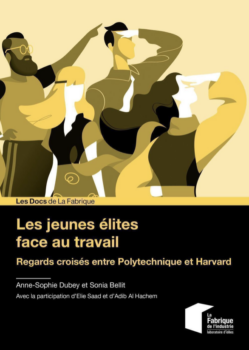
Great Resignation in the United States, increased recruitment difficulties in France, quiet quitting and protests against big business in the grandes écoles (e.g. HEC Paris, AgroParisTech): all these phenomena point to a feeling of fed-upness on the part of employees, especially the younger generations. In fact, many media outlets are reporting on a 'quest for meaning' at work, reflected in new demands on employers (especially in terms of environmental and societal commitment), and in the search for a better work-life balance.
Since the literature points to marked differences linked to social class and level of education, this paper proposes to add a first piece to the jigsaw, by focusing on the expectations of young people from higher social classes. It is based on original empirical material, which crosses the views of 20 alumni from the École polytechnique and Harvard University respectively, to better identify what makes graduates of grandes écoles unique or not in their relationship to work.
Anne-Sophie Dubey is a doctoral student in management science at the Ecole Polytechnique and a researcher at La Fabrique de l'industrie. Her thesis focuses on contemporary forms of autonomy in organisations (including the liberated enterprise).
Sonia Bellit has a doctorate in economics and is project manager at La Fabrique de l'industrie. Her work focuses on industrial policy, Industry 4.0 and disruptive innovation.
With the participation of Elie Saad and Adib Alhachem.
Ralph Katz - Facteurs de performance des équipes projets et GRH des professionnels de la R&D (Ralph Katz - Project team performance factors and HRM for R&D professionals)
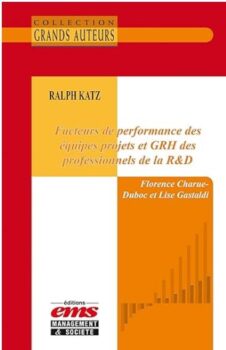 The presentation of Katz's work is structured in three parts. The first is devoted to communication patterns in R&D and their link to project performance, as well as to the individual and organisational factors that foster communication. The second part presents work that is more focused on the HR dimensions, in terms of the career orientations and trajectories of R&D professionals, their expectations in terms of recognition and the factors that motivate them. Although these questions are more focused on individual dimensions, Katz links them to communication patterns and work organisation, seeking to highlight HR practices adapted to the specific characteristics of these professionals and sources of collective performance in R&D. The final section raises a number of questions about and limits to Katz's work, before highlighting his main contributions to the management of innovation, highlighting the many avenues opened up by his work and their relevance in today's context.
The presentation of Katz's work is structured in three parts. The first is devoted to communication patterns in R&D and their link to project performance, as well as to the individual and organisational factors that foster communication. The second part presents work that is more focused on the HR dimensions, in terms of the career orientations and trajectories of R&D professionals, their expectations in terms of recognition and the factors that motivate them. Although these questions are more focused on individual dimensions, Katz links them to communication patterns and work organisation, seeking to highlight HR practices adapted to the specific characteristics of these professionals and sources of collective performance in R&D. The final section raises a number of questions about and limits to Katz's work, before highlighting his main contributions to the management of innovation, highlighting the many avenues opened up by his work and their relevance in today's context.
Florence Charue-Duboc, Chair of the Management of Innovation and Entrepreneurship Department, is a Professor at the École polytechnique and CNRS Research Director at I3-CRG (Centre de Recherche Gestion de l'Ecole polytechnique, part of the Institut Interdisciplinaire de l'Innovation).
Lise Gastaldi is a lecturer in management science at the University of Aix-Marseille and a researcher at LEST (Laboratoire d'économie et de sociologie du travail) UMR Aix-Marseille Université / CNRS. Her work focuses on the management of technological innovation and research and development (R&D) organisations, as well as the HRM of scientific and technical professionals. She conducts research in partnership with major industrial organisations and higher education and research bodies. She teaches human resources management and innovation management at the Faculty of Economics and Management.
Le transport aérien (Air transport)
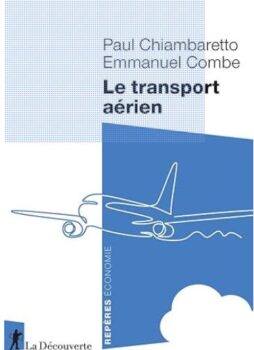 With more than 4 billion air passengers expected by 2023, commercial aviation is now a widely used means of transport throughout the world. This book provides an overview of the way the sector operates, its developments and the challenges it faces, using a three-pronged approach: economic, systemic and forward-looking. The economic approach provides a better understanding of how an airline operates, by identifying its sources of costs and revenues, depending on the type of airline and the distance of its flights. The systemic analysis invites us to take into account the context and ecosystem in which airlines operate: aircraft manufacturers, airports, regulators. The prospective dimension identifies the main challenges that air transport will have to face in the future, foremost among which are the climate transition and the quest for economic sovereignty.
With more than 4 billion air passengers expected by 2023, commercial aviation is now a widely used means of transport throughout the world. This book provides an overview of the way the sector operates, its developments and the challenges it faces, using a three-pronged approach: economic, systemic and forward-looking. The economic approach provides a better understanding of how an airline operates, by identifying its sources of costs and revenues, depending on the type of airline and the distance of its flights. The systemic analysis invites us to take into account the context and ecosystem in which airlines operate: aircraft manufacturers, airports, regulators. The prospective dimension identifies the main challenges that air transport will have to face in the future, foremost among which are the climate transition and the quest for economic sovereignty.
Paul Chiambaretto, professeur agrégé de marketing et stratégie, a rejoint Montpellier Business School en septembre 2013. Il est également chercheur associé à i3-CRG. Il est directeur de la Chaire Pégase, dédiée à l'économie et à la gestion du transport aérien. Il est titulaire d'un doctorat en gestion de l'Ecole Polytechnique (Paris) et d'une Habilitation à Diriger des Recherches de l'Université de Montpellier. Il a été nommé à plusieurs postes de chercheur invité à l'Université d'Oxford (Royaume-Uni), à l'Université Concordia (Canada) et à l'Université d'Umea (Suède).
Paul Chiambaretto, Associate Professor of Marketing and Strategy, joined Montpellier Business School in September 2013. He is also a research associate at i3-CRG. He is director of the Pégase Chair, dedicated to the economics and management of air transport. He holds a doctorate in management from the Ecole Polytechnique (Paris) and an Habilitation to Supervise Research from the University of Montpellier. He has been appointed to several visiting research posts at Oxford University (UK), Concordia University (Canada) and Umea University (Sweden).
Emmanuel Combe, born on 17 April 1968, is a French economist who entered the Ecole Normale Supérieure de Fontenay/Saint Cloud (now the ENS de Lyon) in 1987 in the history and philosophy section, after two years of literary preparatory classes (1985-1987). He was admitted to Sciences Po Paris in 1988.
Handbook on Innovation and Project Management
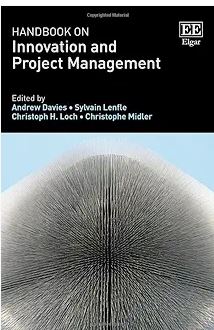 Identifying the origins of innovation management and project management, this unique textbook explains why and how the two fields grew and developed as distinct disciplines, highlighting how and why they are converging today. It explores the theoretical and practical links between innovation and project management, examining the close relationship between the disciplines.
Identifying the origins of innovation management and project management, this unique textbook explains why and how the two fields grew and developed as distinct disciplines, highlighting how and why they are converging today. It explores the theoretical and practical links between innovation and project management, examining the close relationship between the disciplines.
Chapters present new research on how organisations manage innovative projects to compete in global markets and address some of the immense economic, social and environmental challenges facing societies in the 21st century. Leading experts in the field examine the management of innovative projects in a variety of forms and contexts, including R&D, new product development, agile, collaboration, trust and ambidexterity. The handbook highlights efforts to cross-fertilise ideas about innovation and project management, share and create new concepts, and borrow theories from other disciplines to aid empirical research and develop a more integrated research agenda, offering practical advice on how to manage innovative projects in real-world contexts.Comprehensive and invaluable, this handbook is essential reading for researchers and students of innovation management.
Edited by Andrew Davies, Science Policy Research Unit (SPRU), University of Sussex Business School, UK, Sylvain Lenfle, Conservatoire National des Arts et Métiers (CNAM - Département de l'Innovation), France, Christoph H. Loch, Cambridge Judge Business School, University of Cambridge, UK, and Christophe Midler, Centre de Recherche en Gestion-Institut Interdisciplinaire de l'Innovation, CNRS Ecole Polytechnique, Institut Polytechnique de Paris, France.
Télécom Paris
Genèse d’un autoritarisme numérique: Répressions et résistances sur internet en Russie, 2012-2022 (The genesis of digital authoritarianism: Internet repression and resistance in Russia2012-2022) by Françoise Daucé, Benjamin Loveluck and Francesca Musiani
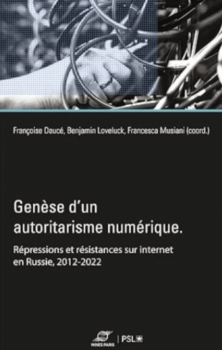 In the wake of the end of the USSR, the Russian Internet initially developed freely, leaving the initiative to many players who invented digital tools tailored to their uses. However, since the beginning of the 2010s, the authoritarian turn at the top of the Russian State has led to the deployment of a network of controls and constraints that have tightened on both the players and the country's digital infrastructures. While the network has long carried the hopes of democratisation in the Russian public sphere, its framework has gradually been built up over the course of controversy and trials. Despite criticism and circumvention by activists and citizens, digital oppression has played a part in political sovereignty and the warmongering dynamic that culminated in the invasion of Ukraine in February 2022.This book, based on fieldwork carried out as part of the ANR ResisTIC project, provides an overview of coercive governance and emancipatory digital uses in Russia, from peace to war. It focuses on the multiple actors and digital objects at the heart of political controversies and usage tensions in the Russian digital space in the 2010s. It shows the processes by which digital oppression is constructed, through the criticisms, conflicts and circumventions that pit public and private players against each other, supporters of the order of the net and defenders of its freedoms. Through the prism of the Russian case, this book examines contemporary digital reconfigurations, from surveillance to sovereignty.
In the wake of the end of the USSR, the Russian Internet initially developed freely, leaving the initiative to many players who invented digital tools tailored to their uses. However, since the beginning of the 2010s, the authoritarian turn at the top of the Russian State has led to the deployment of a network of controls and constraints that have tightened on both the players and the country's digital infrastructures. While the network has long carried the hopes of democratisation in the Russian public sphere, its framework has gradually been built up over the course of controversy and trials. Despite criticism and circumvention by activists and citizens, digital oppression has played a part in political sovereignty and the warmongering dynamic that culminated in the invasion of Ukraine in February 2022.This book, based on fieldwork carried out as part of the ANR ResisTIC project, provides an overview of coercive governance and emancipatory digital uses in Russia, from peace to war. It focuses on the multiple actors and digital objects at the heart of political controversies and usage tensions in the Russian digital space in the 2010s. It shows the processes by which digital oppression is constructed, through the criticisms, conflicts and circumventions that pit public and private players against each other, supporters of the order of the net and defenders of its freedoms. Through the prism of the Russian case, this book examines contemporary digital reconfigurations, from surveillance to sovereignty.
Françoise Daucé is Director of Studies at EHESS and a junior member of the IUF. She studies the relationship between state and society in Russia. Her work focuses on the forms of political domination, both coercive and liberal, that are exercised in different areas: the army, civil society and the media.
Benjamin Loveluck is a lecturer in sociology at i3-SES, Télécom Paris, Institut Polytechnique de Paris and a research associate at the Centre d'études et de recherches en sciences administratives et politiques (CERSA, CNRS-Paris 2). His work focuses on online political practices, digital freedoms and Internet regulation.
Francesca Musiani, who has a doctorate in the socio-economics of innovation from MINES Paris (2012) and is qualified to direct research in sociology (2022), is a CNRS research fellow, co-founder and deputy director of the CNRS Centre Internet et Société. She is an associate researcher at the Centre de Sociologie de l'Innovation (i3, MINES Paris) and at the Internet Governance Lab (American University, USA). Her work focuses on Internet governance, privacy protection and digital infrastructure policies.
Making with data : 25 œuvres de visualisation physique des données dans des objets, des espaces et des expériences of Samuel Huron, Till Nagel, Lora Oehlberg et Wesley Willett (Making with data: 25 works of physical visualization of data in objects, spaces and experiences of Samuel Huron, Till Nagel, Lora Oehlberg et Wesley Willett)
 The book Making with Data, co-authored by researchers from the CNRS, Télecom Paris and the Institut Polytechnique de Paris, is devoted to approaches based on the representation of data through a collection of 25 works of physical visualisation produced by researchers, designers and artists. It offers an overview of how to liberate data from screens and "make the digital tangible", as Hiroshi Ishii, a professor at the MIT Media Lab, would say in the preface. It offers an overview of how to liberate data from screens and "make the digital tangible", as Hiroshi Ishii, a professor at the MIT Media Lab, who wrote the preface, would say.As we are all overwhelmed by the flow of data and digital information, the physical representation of data is part of the reflection on how to deal with it, and the rise of the Do it yourself movement, the makers community and digital craft. The convergence of these two trends is creating a new aesthetic approach: making things with data. The visualisation of physical data is developing in many sectors, thanks to advances in 3D printing and robotics (fablab, automation...) but also in other more traditional dimensions, such as craft, theatre or street collecting.
The book Making with Data, co-authored by researchers from the CNRS, Télecom Paris and the Institut Polytechnique de Paris, is devoted to approaches based on the representation of data through a collection of 25 works of physical visualisation produced by researchers, designers and artists. It offers an overview of how to liberate data from screens and "make the digital tangible", as Hiroshi Ishii, a professor at the MIT Media Lab, would say in the preface. It offers an overview of how to liberate data from screens and "make the digital tangible", as Hiroshi Ishii, a professor at the MIT Media Lab, who wrote the preface, would say.As we are all overwhelmed by the flow of data and digital information, the physical representation of data is part of the reflection on how to deal with it, and the rise of the Do it yourself movement, the makers community and digital craft. The convergence of these two trends is creating a new aesthetic approach: making things with data. The visualisation of physical data is developing in many sectors, thanks to advances in 3D printing and robotics (fablab, automation...) but also in other more traditional dimensions, such as craft, theatre or street collecting.
For more information: https://makingwithdata.org/
Samuel Huron is an information designer and Senior Lecturer in Design at Télécom Paris. His research focuses on how humans create visual and physical representations of abstract information to think, collaborate, learn, analyse, explore and design new representations of data, systems and information artefacts.
Till Nagel is a research professor of visual analysis at Mannheim University of Applied Sciences, where he heads the Human Data Interaction Lab, which investigates new ways of supporting different target groups with interactive data representations. He is co-editor of the book Making with Data (2023), a member of the steering committee of the IEEE VIS Arts Programme (VISAP) and an associate member of the Mannheim Medical Faculty of the University of Heidelberg .
Lora Oehlberg is a computer science researcher based in Canada. Her work focuses on how technology can better support creativity, collaboration, and curiosity in a range of domains, including interaction design, electronic fashion, improvised digital fabrication, physical data representations, improvised theatre, and healthcare innovation.
Germinata (Germinata) by Olivier Fournout
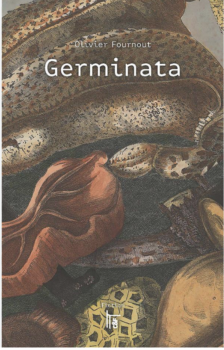 A fictional work written by Olivier Fournout, at the crossroads of literature and the ethical issues raised by contemporary science.For CC22, growing his own garden in 2050 means above all distinguishing himself from his father. Not so easy when you're one of his clones among so many others raised by cyborg mothers. For Psalmonella, it means growing wings and entering into an entanglement with matter. For all the entities of the Great Germination, it means liberating hybridisation. In this universe that is both jubilant and frightening, the characters confront each other, between militancy and unbridled capitalism. In a tension that mirrors that of our times, standardisation taken to its extreme clashes with the cult of individuality.this anticipatory tale embodies the ongoing controversy over transhumanism and scratches the veneer of technological progress. Olivier Fournout delivers an ode to revolt, to what escapes hegemonic powers, determinism and categories.
A fictional work written by Olivier Fournout, at the crossroads of literature and the ethical issues raised by contemporary science.For CC22, growing his own garden in 2050 means above all distinguishing himself from his father. Not so easy when you're one of his clones among so many others raised by cyborg mothers. For Psalmonella, it means growing wings and entering into an entanglement with matter. For all the entities of the Great Germination, it means liberating hybridisation. In this universe that is both jubilant and frightening, the characters confront each other, between militancy and unbridled capitalism. In a tension that mirrors that of our times, standardisation taken to its extreme clashes with the cult of individuality.this anticipatory tale embodies the ongoing controversy over transhumanism and scratches the veneer of technological progress. Olivier Fournout delivers an ode to revolt, to what escapes hegemonic powers, determinism and categories.
Olivier Fournout is a senior lecturer (HDR) at Telecom Paris, in the Economic and Social Sciences department, and a researcher at the Interdisciplinary Institute for Innovation.
